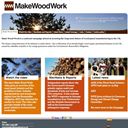- Date:Mon, Jun 28, 2010
Large-scale biomass threatens 8,700 UK jobs...
...and risks a 1% increase in UK emissions
June 28th 2010:Research revealed today has identified that the spiralling development of large-scale wood fired energy plants in the UK threatens 8,700 UK jobs* and risks a 1%, or six million tonne, increase in UK carbon emissions.These are the headline findings of two independent reports commissioned by the Wood Panel Industries Federation, the voice of the UK industry, which today launches a survival campaign, 'MAKE WOOD WORK', to counter the severe market distortion its members face from the Renewables Obligation (RO) subsidy regime.Wood panels, a vital component in the construction industry and in furniture manufacture, are produced from virgin and reclaimed wood - the same materials which biomass energy plants are being incentivised to burn by Government policy driven subsidy.The Wood Panel Industry in the UK, A report for the Wood Panel Industries Federation, conducted by Europe Economics, found that:
- The total gross UK employment attributable to wood panel manufacture amounts to 8,700 full time equivalent jobs
- If large-scale wood fired power generators demand for UK-sourced wood is encouraged to develop unchecked, the sawmilling sector could also experience structural change in which generators will buy the whole tree and invest in forest properties and product preparation. The employment effects will therefore not be confined to wood panel manufacturing but could extend to the 12,000 or so people estimated by the Forestry Commission to work in sawmilling and related activities
Further research from CarbonRiver, identified that:
- To subsidise the purchase of wood for incineration - as the current ROC scheme does - is to encourage the most carbon-intensive use of that resource
- If the ROC subsidy continues to distort the market such that panel manufacture is displaced by the biomass industry - as trends suggest it might - there would be an increase in net CO2 emissions equivalent to 1.5 tonnes of CO2 per tonne of wood processed, a total increase of 6 million tonnes or 1% on the UK's total net CO2 emissions each year (more than the total emissions of UK agriculture last year)
In simple terms, the wood panel manufacturing sector is under threat because electricity generators, supported by subsidy, can afford to pay more than double the price currently paid by the UK wood panel industry for its primary raw material. The blame lies with the introduction of the RO, which has distorted the market and resulted in WPIF members seeing an average wood price increase over the last four years in excess of 30%.
Alastair Kerr, Director General of the Wood Panel Industries Federation comments: "Our research proves categorically that the Government's renewable energy policies - specifically support for biomass - are directly damaging the competitiveness of the wood panel industry in the UK, which is wholly reliant on domestically-sourced wood.
"If nothing is done to amend this policy, wood prices could potentially rise to a point where they meet that paid by generators for imported material. This will put thousands of jobs in the UK wood panel and associated industries at risk and has the potential to escalate costs for the construction and furniture industries. Consumers of UK-sourced products, who are already paying for the subsidy through their electricity bills, cannot escape the impact of this distortion.
"The Government is putting too great an emphasis on large scale wood-fired electricity and, by subsidising generators' ability to pay for fuel, they are threatening to destroy an industry that adds economic value and brings environmental benefit through carbon storage.
"We are not anti-biomass and, indeed, as an industry we have pioneered the burning of our process-derived wood waste to generate heat and power, which is then fed back into our own manufacturing process.
"Backed by MPs and a wide range of other organisations and individuals, our campaign today calls for a more responsible use of wood - one of our most precious natural resources. But, importantly, we are not asking for special treatment - just a level playing field."
As a result, and through the MAKE WOOD WORK campaign, the Wood Panel Industries Federation (WPIF) is calling on Government to:
- Modify the ROC banding in such a way as to remove its distortion in the market. The WPIF supports subsidy for capital expenditure in the UK biomass sector but not subsidy for its use of domestic wood as a feedstock
- Ban wood - an increasingly precious resource - from landfill and maximise the lifespan of all wood in the UK
- Focus the subsidy on the expansion of non-wood fuels and fast-rotation crops, as these have a greater potential to reduce CO2emissions in the short term. In the long term, the amount of UK forest cover should be increased
- Only allow wood that has reached the end of its useful life, and after recycling opportunities have been exhausted, to be used by the energy sector in installations that maximise the heat potential of this valuable resource
- Recognise the wood panel industry's sizeable contribution to UK renewable heat generation under the Renewable Heat Incentive - and treat it as a special case by including its eligibility in the RHI and offer our industry an essential lifeline
*From Europe Economics' report "If the industry vanished today, the loss of employment would be some 8,700 jobs gross and about 4,400 net (taking account of the standard government re-absorption factor, which recognises that, over time, displaced employees find other employment)"
- ENDS -


